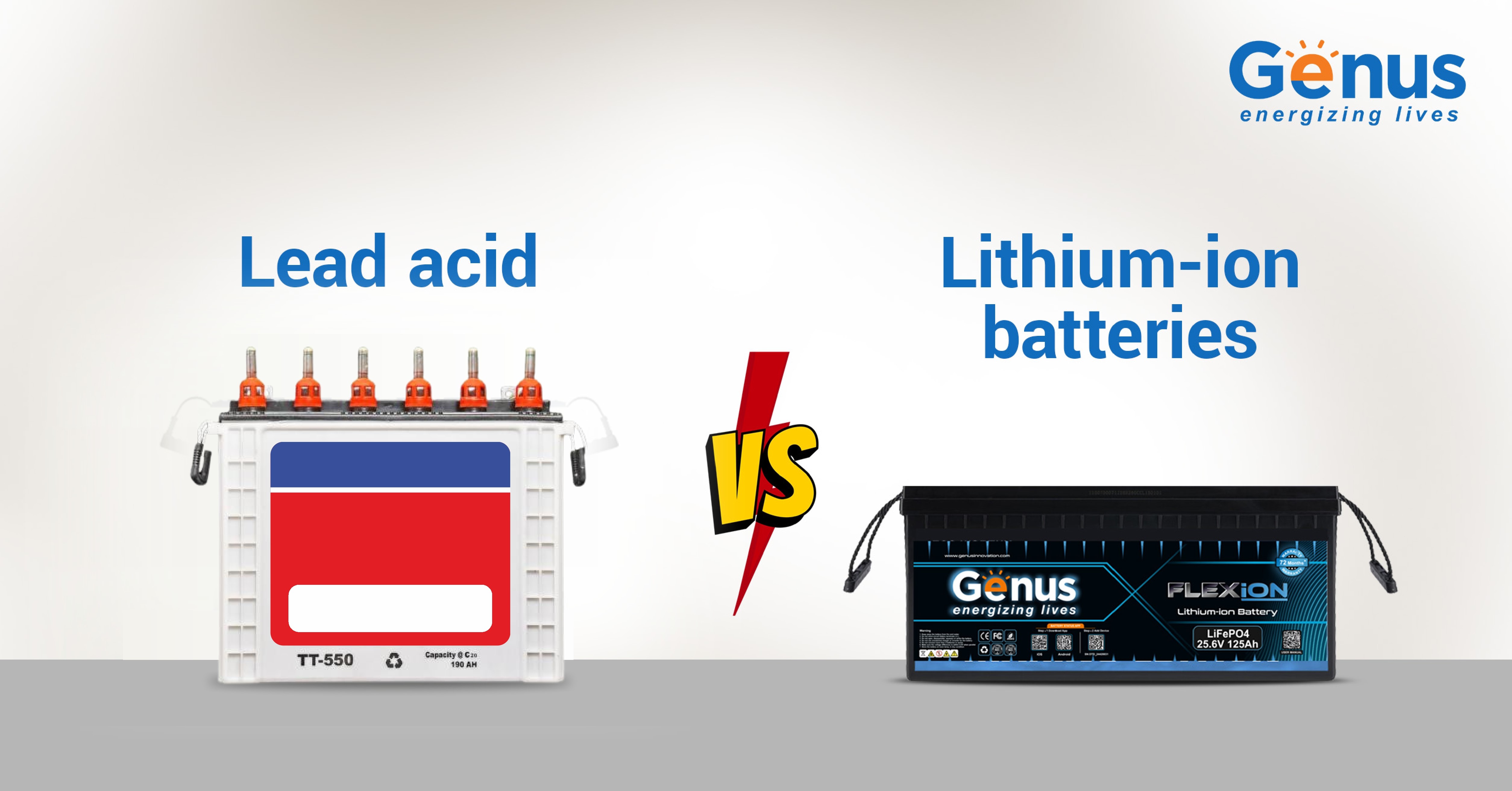
Tired of power cuts ruining your summer comfort? With the heat rising and electricity dropping, having a reliable inverter battery is no longer a luxury — it’s a necessity. But choosing the right one can be confusing, especially with so many options out there. Should you go for the traditional lead-acid battery or switch to the smarter lithium-ion alternative? Don’t worry — we’ve broken it all down for you in this easy-to-follow guide on how to select the best inverter battery for your home.
From understanding your home’s power needs to comparing the pros and cons of each battery type, this blog will help you make the right choice for long-lasting comfort and peace of mind.
The core component of every power backup system is an inverter battery. Depending on the usage, performance and maintenance, users might need to replace an inverter battery twice or more over time.
The battery wears out due to repetitive charging, discharging, and heat exposure. However, some battery maintenance tips can also help extend the battery’s lifespan. It is therefore recommended to get the inverter battery from a reliable and renowned manufacturer to ensure durability and efficiency.
What is an inverter battery?
The battery serves to be a very important part of the functioning of an inverter. When the power supply is available (grid power), it stores energy in the form of Direct current (DC). During a power cut, the inverter pulls this energy stored in the battery, converts this DC power to alternating current (AC), and runs the household appliances.
Types of inverter batteries: Lead acid vs. lithium-ion
What is a lead-acid battery?
A lead-acid battery is one used for decades in automobiles, inverters and UPS systems. This traditional style battery consists of lead plates that are submerged in sulfuric acid for storing and discharging energy.
What is a lithium-ion battery?
This is a more advanced battery that is rechargeable and uses lithium compounds for efficient storage and delivery of power. These are widely used in laptops, smartphones, electric vehicles and modern power backup systems.
Why should you upgrade to lithium-ion batteries?
Lithium-ion batteries offer several advantages over lead-acid batteries that make them an ideal choice for modern-day power backup systems, such as:
Long battery life:
Lithium-ion batteries have a longer lifespan compared to lead-acid batteries, which serves as one of their biggest advantages. While a lead-acid battery lasts 3-5 years, a lithium-ion battery lasts up to 12 years.
Zero maintenance:
Lithium-ion batteries are maintenance-free, unlike lead-acid batteries that require frequent water top-ups and regular cleaning. So lithium-ion batteries are free from the hassle of maintenance, which saves time and effort.
Faster charging:
If your area is prone to frequent power cuts, then you must go for lithium-ion batteries to enjoy an uninterrupted power supply. This is because lithium-ion batteries charge 2X faster than lead-acid batteries and therefore recover quickly from power cuts.
Energy efficient:
Compared to the 60-65% efficiency of lead acid batteries, lithium-ion batteries are up to 95% energy efficient. This means that you can get more usable power per charge from lithium batteries compared to lead-acid batteries.
Also Read: How to Calculate Your UPS/Inverter Battery Back-up Time?
Lightweight and compact:
The lithium-ion batteries are compact and lightweight compared to the heavy and bulky lead-acid batteries. This makes the Li-ion battery a perfect option for modern-day homes and for compact spaces as well.
Environment-friendly:
Lead-acid batteries contain harmful chemicals and release toxic fumes sometimes that make their disposal difficult. On the other hand, there are no hazardous chemicals in lithium-ion batteries which makes them eco-friendly as well as safe.
Cost-effective:
While it appears that the upfront cost of lithium-ion batteries is higher, they prove to be more cost-efficient in the long run since they have:
- High energy efficiency
- Longer lifespan
- Zero maintenance costs
- Lower electricity consumption
Key differences: Lead Acid vs lithium-ion
| Feature | Lead Acid Battery | Lithium-Ion Battery |
| Battery life | 3-6 years | 8-12 years |
| Charging time | 10-12 hours | 4.5-5 hours |
| Maintenance | High (regular water top-up and cleaning) | Zero maintenance |
| Weight | Heavy | Lightweight |
| Cost | Recurring expense | One-time quality investment |
Why choose an inverter with a lithium-ion battery?
The nature of the power output that you receive heavily depends on the inverter battery that you use. Therefore, it is critical to select the best battery for the inverter. Lithium-ion batteries clearly win over lead-acid batteries with their multiple advantages mentioned above. When it comes to your budget as well as electricity demands, Genus Innovation brings the most energy-efficient and long-lasting lithium-ion inverter batteries. They serve as an ideal choice to withstand frequent and extended power cuts.
Introducing MaxiLion- The best integrated Lithium-ion battery inverter
Get an uninterrupted power supply even during longer power cuts with our best Lithium-ion battery inverter MaxiLion. This inverter is built with high load capacity, more charge cycles, and extended duration backup to endure peak energy demands. Forget the hassle of regular maintenance, cleaning, and water topping up with the no-maintenance MaxiLion.
Key benefits of MaxiLion:
Durable battery: The Li-ion battery is durable and helps save money in the long run by reducing replacement costs
Fast charging: It gets charged quickly, so recovery from a power outage is also quick.
Energy efficient: Lower electricity bills with high energy efficiency.
Lightweight and compact: These features make it an ideal choice for modern-day homes and offices.
Therefore, a reliable lithium-ion battery inverter is the way to go for enjoying a beautiful, stress-free summer with an uninterrupted power supply.
Make the smart choice today:
It is now clear that lithium-ion is the clear winner when we compare lead acid vs lithium-ion batteries. They offer fast charging, longer life, high energy efficiency, zero maintenance, and reliable backup. So, make the smart choice and switch to the best lithium-ion battery inverter-MaxiLion. Buy now at attractive limited-time offers and get summer-ready.
Also Read: Which is the Best UPS or Inverter for 2 BHK flat?
FAQs
Can Lithium-ion batteries replace lead-acid batteries?
Yes it is possible to replace lead-acid batteries with lithium-ion batteries if proper safety measures are ensured and by progressing the charging components.
How are lead-acid batteries different than lithium-ion batteries?
The material used to make them primarily differentiates lead-acid and lithium-ion batteries.
Why lithium-ion batteries are expensive compared to lead-acid batteries?
Lithium-ion batteries might look expensive buy they are more efficient compared to lead-acid batteries and their capacity is also higher.
Which battery lasts longer in Lead-acid and Lithium-ion?
Lithium-ion batteries typically last 3–5 times longer than lead-acid batteries. This is the reason why they serve to be a better long-term investment.
How do I choose between lead-acid and lithium-ion batteries?
The selection depends on your budget, usage needs, maintenance preference and available space. While lithium-ion serves to be a good option for low-maintenance, lead-acid are good to go if you are tight on budget.
